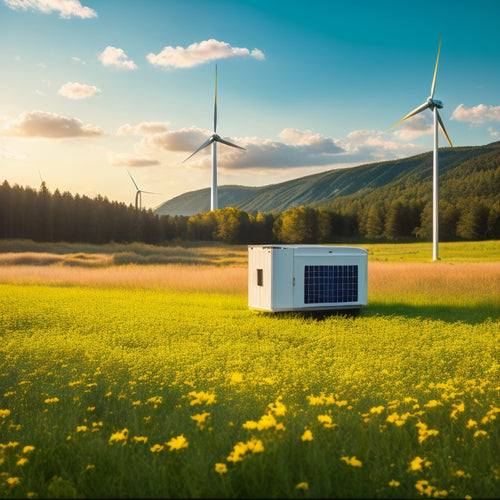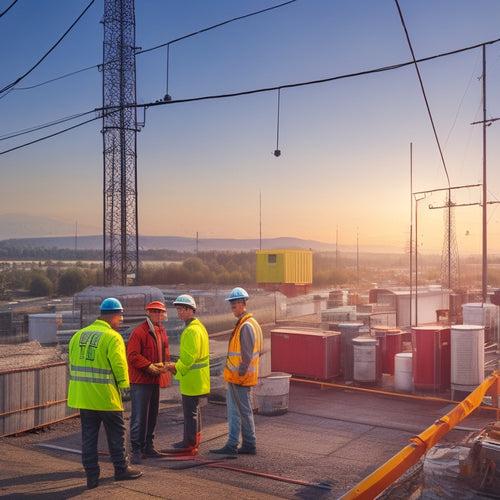
Solar Battery Backup for Home
Share
When the grid fails, a solar battery backup system guarantees your home remains comfortable, safe, and connected. You'll maintain power to essential appliances, medical equipment, and communication devices, minimizing the impact of outages on your daily life. Properly sized systems evaluate your energy requirements, prioritizing critical needs. High-quality deep cycle batteries with adequate storage capacity provide reliable backup power. By understanding your energy usage patterns and peak demands, you can optimize your system for maximum efficiency. Now, uncover how solar battery backup systems can provide energy independence, reduce your carbon footprint, and enhance your property value.
The Essentials
- A solar battery backup system provides reliable emergency electricity during outages, ensuring essential appliances remain operational for comfort and safety.
- Properly sizing a system ensures adequate power during outages, allowing for a seamless transition to backup power and prioritizing specific needs.
- High-quality deep cycle batteries with high energy storage capacity and long lifespan are crucial for extended backup duration during outages.
- Solar battery backup systems require less maintenance than generators, with an expected lifespan of 10 to 15 years or more, and offer long-term cost savings.
- A well-designed system lowers reliance on fossil fuels, decreasing carbon emissions, and provides energy independence, potential savings, and enhanced property value.
Reliable Power During Outages
When the grid goes down, you need a reliable backup power source to keep your essential appliances running. A solar battery backup system provides an emergency electricity supply, ensuring you have power when you need it most.
With a properly sized system, you can rest assured that your home will remain comfortable and safe during outages. This is especially vital for households with critical medical equipment Home Energy Storage that require a continuous power supply, and for protecting sensitive electronics from damaging power surges.
Backup Power Sources
While you're enjoying the benefits of solar energy, a sudden outage can leave you in the dark, literally. This is where backup power sources come into play. As you adopt sustainable practices and alternative energy solutions, it's crucial to have a reliable backup plan in place.
A solar battery backup system guarantees you have power when you need it most. By installing a Solar Power Backup system, you can say goodbye to the inconvenience of lost productivity, spoiled food, and compromised safety Reliable Electricity Supply.
With a backup power source, you can rest easy that your critical appliances will continue to function during an outage. This means your refrigerator will keep your food from spoiling, and your lights will stay on, providing a sense of security and comfort. A backup power source also enables you to power essential medical equipment, communication devices, and other critical systems.
When selecting a backup power source, consider the capacity, type, and durability of the system. Look for systems with a long lifespan, high efficiency, and low maintenance requirements.
Emergency Electricity Supply
During prolonged grid outages, you're not just dealing with inconvenience - you're facing a potential crisis. Without a reliable source of power, your home can quickly become uninhabitable. Food spoils, medications go bad, and communication devices become useless. This is where an emergency electricity supply comes in - a critical component of your solar battery backup system.
A well-designed solar installation with battery upgrades can provide a seamless shift to backup power during outages. But how do you know if your system is up to the task? Here's a breakdown of what you need to evaluate:
| Scenario | Power Requirements | Backup Time |
|---|---|---|
| Refrigeration only | 1-2 kW | 8-12 hours |
| Basic lighting and appliances | 2-4 kW | 4-8 hours |
| Full home backup | 5-10 kW | 2-4 hours |
| Critical medical equipment | 1-5 kW | 24+ hours |
When designing your emergency electricity supply, it is crucial to assess your specific needs and prioritize your power requirements. By doing so, you can guarantee that your solar battery backup system provides the reliable power you need during outages, giving you the freedom and peace of mind you deserve.
Reduced Carbon Footprint Guarantee
You're likely aware that solar battery backup systems offer an eco-friendly energy solution, allowing you to reduce your reliance on fossil fuels and lower your carbon emissions.
By integrating a renewable energy source like solar power into your home's energy mix, you'll greatly decrease your carbon footprint.
Furthermore, with affordable options like off grid solar battery backup systems, homeowners can now access reliable backup power during outages without breaking the bank.
This sustainable approach guarantees a cleaner, healthier environment for future generations.
Eco-Friendly Energy Solution
Switching to solar battery backup for your home is a significant step towards minimizing your reliance on fossil fuels and reducing your carbon footprint. This eco-friendly energy solution not only benefits the environment but also provides you with energy independence. With solar incentives, you can enjoy significant savings on your energy bills while contributing to a cleaner and greener future.
| Benefits | Description | Advantages |
|---|---|---|
| Reduced Carbon Footprint | Minimize reliance on fossil fuels | Contribute to a cleaner environment |
| Energy Independence | Generate your own clean energy | Reduce energy bills and reliance on grid power |
| Increased Property Value | Enhance your home's value | Improve your property's appeal and resale value |
| Government Incentives | Take advantage of solar incentives | Enjoy significant savings on energy bills |
Renewable Energy Source
As you employ the power of solar energy, you're guaranteed a reduced carbon footprint, ensuring a cleaner environment for future generations.
By capturing the sun's energy, you're reducing your reliance on fossil fuels, a major contributor to greenhouse gas emissions. This renewable energy source not only benefits the environment but also provides you with energy independence, freeing you from the grid's constraints.
Solar energy is a clean and sustainable way to power your home, and with solar incentives, the cost of converting to solar is more affordable than ever.
These incentives can greatly reduce the upfront cost of installation, making solar energy a more viable option for homeowners.
With a solar battery backup system, you can store excess energy generated during the day for use during the night or on cloudy days, ensuring a steady supply of power.
Deep Cycle Battery Technology
You'll want to contemplate two vital aspects of deep cycle battery technology when selecting a solar battery backup for your home: battery life expectancy and energy storage capacity.
These factors directly impact the system's overall performance and reliability. When choosing a deep cycle battery, it's important to take into account the type of battery chemistry, such as lithium ion battery, which offers high energy density and long lifespan.
Additionally, understanding the battery's depth of discharge (DOD) and round-trip efficiency are significant in optimizing the system's performance.
Battery Life Expectancy
Deep cycle batteries, the heart of your solar battery backup system, are engineered to provide a specific number of charge cycles before their capacity starts to degrade. As you use your system, your batteries will undergo charging cycles, and with each cycle, their capacity will gradually decrease. This process is known as battery degradation.
You'll want to know how many charging cycles your batteries can handle before their capacity drops to 80% of their original state. This is typically considered the end of their useful life. The number of charging cycles your batteries can handle varies depending on the manufacturer, quality, and type of battery. On average, high-quality deep cycle batteries can handle between 3,000 to 5,000 charging cycles.
To maximize the life of your batteries, you should monitor their state of charge, avoid extreme temperatures, and guarantee they're properly maintained.
Energy Storage Capacity
Maximizing energy storage capacity is critical in a solar battery backup system, as it directly impacts the duration of backup power during outages. When you're shopping for a deep cycle battery, you'll want to prioritize energy efficiency to guarantee your system can store as much power as possible.
You'll need to evaluate factors like the battery's capacity rating, measured in ampere-hours (Ah), to determine its overall energy storage capacity. A higher capacity rating means more energy can be stored, resulting in longer backup power durations. Additionally, look for batteries with high depth-of-discharge (DOD) ratings, as these can handle deeper discharge cycles without sacrificing performance.
When selecting a storage solution, you'll want to balance energy storage capacity with your specific energy needs. For example, if you have a smaller energy footprint, a lower-capacity battery may suffice. However, if you have multiple appliances to power during an outage, you'll need a higher-capacity battery to meet those demands.
Check Your Energy Demands
You need to grasp your energy usage patterns to determine the right solar battery backup for your home.
Your daily power requirements, including the wattage and duration of energy usage, will help you size your system correctly. By examining your energy demands, you'll be able to identify the crucial appliances you want to power during an outage.
It's vital to evaluate your energy storage needs, especially when paired with home energy storage systems like solar panels and inverters, to guarantee a reliable backup power supply.
Energy Usage Patterns
Across various times of the day, your home's energy usage fluctuates, influenced by factors such as the number of people present, their activities, and the appliances in use.
Understanding these energy usage patterns is essential to optimize energy efficiency and identify opportunities for improvement. You can analyze your energy usage trends by monitoring your energy consumption at different times of the day, week, and month.
This will help you identify peak usage periods, such as morning and evening when lights, appliances, and HVAC systems are in use. You'll also notice variations in usage based on seasonal changes, like increased heating or cooling demands during winter or summer.
By recognizing these patterns, you can adjust your energy usage habits to reduce consumption during peak periods, optimize your energy storage, and prioritize energy-efficient appliances.
This knowledge will also help you design an effective solar battery backup system that meets your unique energy needs, ensuring a reliable and efficient power supply when you need it most.
Daily Power Requirements
Most households require a substantial amount of power to support daily activities, with the average American home consuming around 30 kilowatt-hours (kWh) of electricity per day.
To determine your daily power requirements, you'll need to calculate your peak usage, which typically occurs in the morning and evening when most appliances are in use.
You can check your energy demands by reviewing your past electricity bills or using a smart plug to monitor your energy usage. Identify the essential appliances you need to power during an outage, such as refrigerators, lights, and medical equipment.
Consider energy efficiency when selecting appliances, as they'll reduce your overall energy consumption.
For a solar battery backup system, it's vital to accurately assess your daily power requirements to guarantee you have sufficient energy storage.
You'll need to balance your energy needs with the capacity of your solar panels and battery bank. By doing so, you'll be able to enjoy the freedom and security of having a reliable backup power source during grid outages.
Longer Lifespan Than Generators
You'll find that solar battery backup systems require less maintenance compared to generators, which translates to a longer lifespan and reduced costs over time.
This is because solar batteries have fewer moving parts and are less prone to mechanical failure, reducing the need for frequent repairs and replacements.
As a result, you can expect your solar battery backup system to last for 10 to 15 years or more, depending on the quality of the equipment and your usage patterns.
Less Maintenance Required
One significant advantage of solar battery backup systems over traditional generators is their low maintenance requirements, which directly translate to a longer lifespan.
You'll appreciate the reduced hassle and expense that comes with owning a solar battery system. Unlike generators, which require regular oil changes, filter replacements, and spark plug maintenance, solar batteries have few moving parts and are designed to last for decades with minimal upkeep.
During the installation process, your solar battery system is configured to operate efficiently and quietly, with automatic monitoring and control systems that alert you to any issues.
This means you'll spend less time and money on maintenance, and more time enjoying the freedom and independence that comes with having a reliable backup power source.
When considering cost considerations, remember that the long-term savings from reduced maintenance and extended lifespan can more than justify the initial investment in a solar battery backup system.
Frequently Asked Questions
Can I Use My Existing Solar Panel System With a Battery Backup?
You can likely repurpose your existing solar panel system with a battery backup, but first, assess system compatibility to guarantee seamless integration, and factor in potential installation costs to upgrade or replace incompatible components.
How Long Does It Take to Install a Solar Battery Backup System?
You'll typically spend 1-3 days installing a battery backup system, depending on the complexity of your setup and battery types, with a well-planned installation timeline ensuring a seamless integration with your existing infrastructure.
Are Solar Battery Backups Eligible for Government Incentives?
You'll be pleased to know that solar battery backups qualify for various government incentive programs, offering tax credits that offset installation costs, resulting in significant energy savings and a reduced environmental impact, as long as your system meets compatibility requirements.
Can I Charge My Electric Vehicle With a Solar Battery Backup?
You're wondering if you can charge your electric vehicle with a solar battery backup, right? Yes, you can, but consider the charging options and installation costs, as they'll impact your energy independence and overall savings.
Do Solar Battery Backups Require Regular Maintenance?
You'll want to know that solar battery backups do require regular maintenance to guarantee peak performance. Typically, you'll need to check and balance the batteries every 3-6 months, which can extend their lifespan and maintain their efficiency.
Final Thoughts
You've finally found a way to escape the dark ages of power outages - a solar battery backup for your home. Ironically, it's not about being off the grid, but being on top of it. With a reliable power source during outages, you'll reduce your carbon footprint and enjoy the benefits of deep cycle battery technology. By evaluating your energy demands, you'll uncover a longer lifespan than those noisy generators. It's time to shine a light on the future of clean energy.
Related Posts
-

Is This the Future of Alternative Energy Systems
Yes, alternative energy systems are shaping the future of energy. Innovations in solar and wind technologies are driv...
-

Sustainable and Eco-Friendly Generators for a Reduced Carbon Footprint
Sustainable and eco-friendly generators are perfect for cutting your carbon footprint and increasing energy efficienc...
-

Smart Grid Technology Implementation Challenges
You'll encounter several challenges when implementing smart grid technology, particularly in cost management, scalabi...


